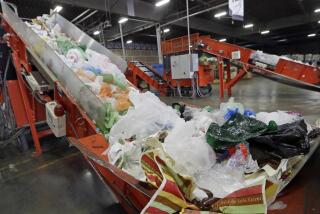Trash at Curb Is Not Private, Justices Hold : California Bar on Police Garbage Searches Voided
- Share via
WASHINGTON — The Supreme Court said Monday that police officers may inspect trash placed at curb side for incriminating evidence, overturning the policy of California’s state courts and reinstating drug evidence against a Laguna Beach man.
On a 6-2 vote, the justices said that such police inspections do not violate the Fourth Amendment’s ban on unreasonable searches because residents have no reason to believe that their discarded trash is private.
The ruling will give police a new tool in gaining enough evidence, particularly in narcotics cases, to justify a full-scale search of homes or businesses. In this case, Laguna Beach police officers found traces of cocaine in trash from the home of a man suspected of being a drug dealer, and they used that evidence to obtain a search warrant.
States Differed on Issue
The high court decision brings California courts into line with those in other states. The California Supreme Court ruled in 1971 that searches of discarded trash violate the Fourth Amendment, and state court judges had been obliged to follow that rule. But virtually every other state court and federal appellate court that has considered the issue has concluded that such trash may be searched by the police.
In examining the trash bags in this case (California vs. Greenwood, 86-684), the court majority and dissenters saw something quite different.
Justice Byron R. White, writing for the court, said that the bags contained discarded material. “It is common knowledge that plastic garbage bags left on or at the side of a public street are readily accessible to animals, children, scavengers, snoops and other members of the public,” he said.
If the trash can be picked through by dogs or scavengers, White said, it cannot be considered private.
But Justice William J. Brennan Jr. countered that “a search of trash, like a search of the bedroom, can relate intimate details about sexual practices, health and personal hygiene. A single bag of trash testifies eloquently to the eating, reading and recreational habits of the person who produced it,” he said in a dissent joined only by Justice Thurgood Marshall.
Laguna Beach Case
In this case, Laguna Beach police suspected that the recreational habits, as well as the business activity, of Billy Greenwood centered on cocaine. Officers staked out his house after receiving a tip in February, 1984, from a federal narcotics agent that Greenwood was a drug dealer.
They were unable to confirm their suspicions, so they arranged with a garbage collector to let them inspect the trash bags that were removed from Greenwood’s curb side. There, they found drug paraphernalia and traces of cocaine, and they used this evidence to obtain a search warrant. Inside Greenwood’s residence, they found several pounds of cocaine.
Before trial, Greenwood’s lawyer moved to have the evidence dismissed, and a plainly reluctant judge agreed. An appellate court in Santa Ana upheld the order, saying that it, too, was bound by the state high court ruling. In August, 1986, the California Supreme Court, with Chief Justice Rose Bird still in charge, refused to hear an appeal filed by Orange County prosecutors.
Last year, the U.S. Supreme Court heard the case of an alleged Hollywood bookmaker who had been arrested after a search of his trash, but the justices dismissed the case because of a procedural flaw. Even then, however, the court majority suggested that the California court policy was incorrect and should be overturned.
Trash Searches Held Limited
Michael J. Pear, the Orange County deputy district attorney who argued the Greenwood case before the high court, said that he did not expect police officers to be constantly sifting through neighborhood trash.
“It is not the kind of thing officers readily volunteer for. It comes up in the situation where there is no other lead,” Pear said.
The high court did not give police a right to inspect trash that is placed next to a house. White’s opinion refers only to trash that is “left for collection outside the curtilage of the home.” Generally, the court has defined the curtilage to include the areas immediately adjacent to a home and perhaps a fenced-in yard.
In other actions, the high court:
--Upheld a $1.8-million punitive damage award against an insurance company that failed to pay a $20,000 claim by a Mississippi man who lost a limb (Bankers Life vs. Crenshaw, 85-1765). This was one of the most closely watched cases of the term because dozens of major corporations had urged the justices to use it to rein in “excessive” damage awards. The court refused, saying that the appeal had not been properly presented in Mississippi. Further, the court upheld a 15% penalty tacked on under Mississippi law for unsuccessful appeals.
Spy Conviction Stands
--Let stand the espionage conviction of U.S. spy agency employee Ronald W. Pelton, who was caught trying to sell secret information at the Soviet Embassy. Pelton contended that the Foreign Intelligence Surveillance Act is unconstitutional because it was being used to gather criminal evidence without search warrants. But the justices unanimously dismissed his appeal (Pelton vs. U.S., 87-6433).
More to Read
Sign up for Essential California
The most important California stories and recommendations in your inbox every morning.
You may occasionally receive promotional content from the Los Angeles Times.














